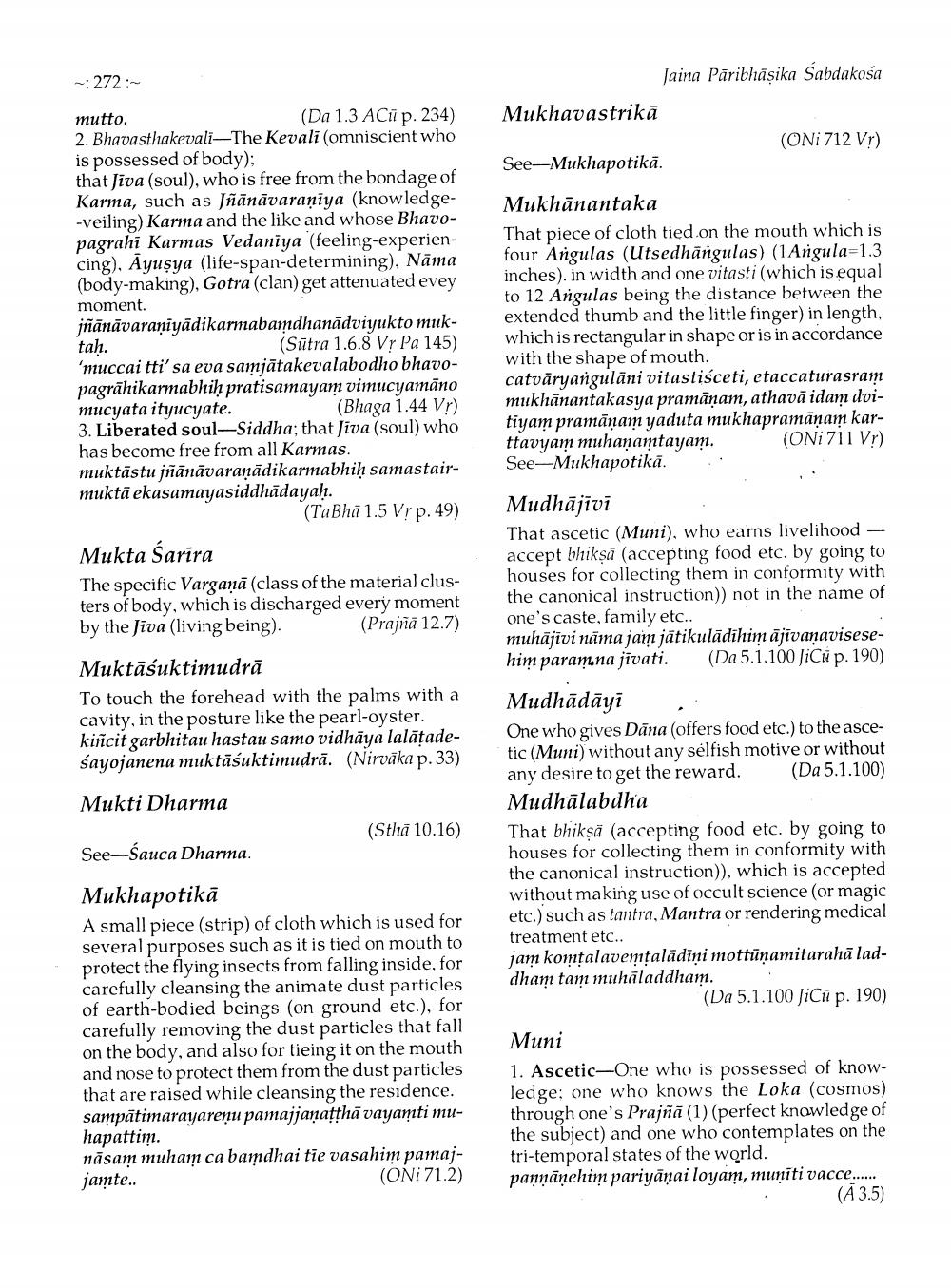________________
~:272~
mutto.
(Da 1.3 AC p. 234) 2. Bhavasthakevali-The Kevali (omniscient who is possessed of body);
that Jiva (soul), who is free from the bondage of Karma, such as Jñanavaraniya (knowledge-veiling) Karma and the like and whose Bhavopagrahi Karmas Vedaniya (feeling-experiencing). Ayuşya (life-span-determining). Näma (body-making), Gotra (clan) get attenuated evey
moment.
taḥ.
jñānāvaraṇiyādikarmabamdhanädviyukto muk(Sutra 1.6.8 Vr Pa 145) 'muccai tti' sa eva samjätakevalabodho bhavopagrähikarmabhih pratisamayam vimucyamāno mucyata ityucyate. (Bhaga 1.44 Vr) 3. Liberated soul-Siddha; that Jiva (soul) who has become free from all Karmas. muktāstu jäänävaraṇādikarmabhiḥ samastairmukta ekasamayasiddhädayaḥ.
(TaBha 1.5 Vr p. 49)
Mukta Śarira
The specific Vargaṇa (class of the material clusters of body, which is discharged every moment by the Jiva (living being). (Praja 12.7)
Muktaśuktimudra
To touch the forehead with the palms with a cavity, in the posture like the pearl-oyster. kiicit garbhitau hastau samo vidhaya lalaṭadeSayojanena muktāśuktimudrā. (Nirvaka p.33)
Mukti Dharma
(Stha 10.16)
See-Sauca Dharma.
Mukhapotikā
A small piece (strip) of cloth which is used for several purposes such as it is tied on mouth to protect the flying insects from falling inside, for carefully cleansing the animate dust particles of earth-bodied beings (on ground etc.), for carefully removing the dust particles that fall on the body, and also for tieing it on the mouth and nose to protect them from the dust particles that are raised while cleansing the residence. sampatimarayareņu pamajjaṇattha vayanti muhapattim.
nasam muham ca bamdhai tie vasahim pamajjamte.. (ONI 71.2)
Jaina Päriblaṣika Sabdakosa
Mukhavastrikä
See-Mukhapotikā.
Mukhanantaka
That piece of cloth tied on the mouth which is four Angulas (Utsedhängulas) (1Angula-1.3) inches). in width and one vitasti (which is equal to 12 Angulas being the distance between the extended thumb and the little finger) in length, which is rectangular in shape or is in accordance with the shape of mouth.
catvaryanguläni vitastiśceti, etaccaturasram mukhanantakasya pramānam, athava idam dvitiyam pramaṇam yaduta mukhapramäṇam karttavyam muhanamtayam. (ONI 711 Vr) See-Mukhapotika.
(ONI 712 Vr)
Mudhājivi
That ascetic (Muni), who earns livelihood accept bhiksa (accepting food etc. by going to houses for collecting them in conformity with the canonical instruction)) not in the name of one's caste, family etc..
muhájivi nämajam jätikuladihim ājīvanavisesehim paramna jivati. (Da 5.1.100 JiCap.190)
Mudhädäyi
One who gives Dana (offers food etc.) to the ascetic (Mini) without any selfish motive or without any desire to get the reward. (Da 5.1.100) Mudhalabdha
That bhiksa (accepting food etc. by going to houses for collecting them in conformity with the canonical instruction)), which is accepted without making use of occult science (or magic etc.) such as tantra, Mantra or rendering medical treatment etc..
jam komtalavemṭalādiņi mottūṇamitarahaladdham tam muhāladdham.
(Da 5.1.100 JiCi p. 190)
Muni
1. Ascetic-One who is possessed of knowledge: one who knows the Loka (cosmos) through one's Prajña (1) (perfect knowledge of the subject) and one who contemplates on the tri-temporal states of the world. pannanchim pariyāṇai loyam, muniti vacce........ (Ā 3.5)




